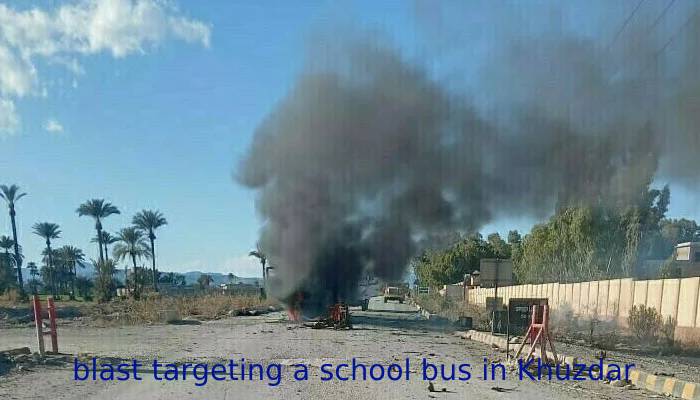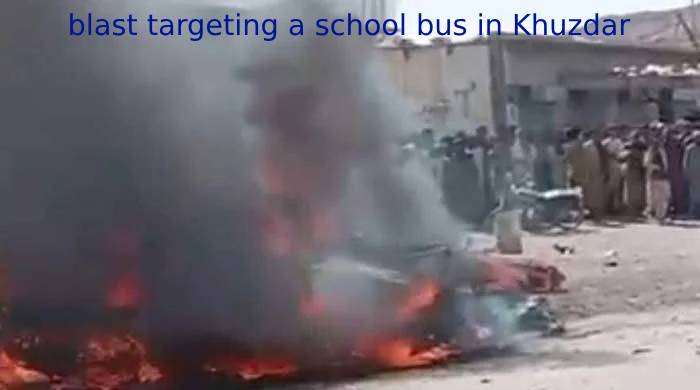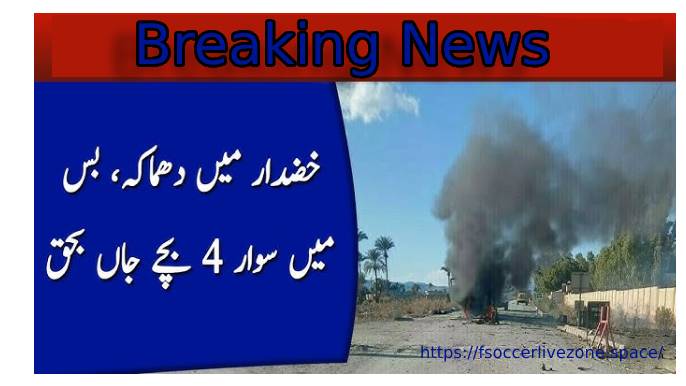A deadly school bus bombing in Khuzdar, Balochistan kills at least 4 children and injures over 38. Discover full details, government response, and the broader security context of this tragic attack.
On the morning of May 21, 2025, a horrifying suicide bomb blast struck a school bus in the Khuzdar district of Balochistan, Pakistan, claiming the lives of at least four innocent children and injuring more than 38 others. The targeted vehicle belonged to the Army Public School and was en route to pick up students when it was hit near the Zero Point area.
This brutal attack has sent shockwaves across the country, reigniting concerns over security in one of Pakistan’s most volatile regions. The incident underscores the persistent threat of militancy and violence in Balochistan and has prompted national condemnation and demands for stronger counterterrorism measures.
The Attack: What Happened in Khuzdar
According to local authorities and eyewitness reports, the suicide bombing occurred early in the morning while the school bus was making its usual rounds. The explosion took place in the Zero Point area of Khuzdar city, which is situated in the southern region of Balochistan.
Yasir Iqbal Dashti, a senior government official in Khuzdar, confirmed the attack and the number of casualties. “It was a suicide blast targeting the school bus of Army Public School. The attacker detonated himself near the vehicle, killing four children on the spot and injuring dozens,” he stated.
Emergency responders rushed to the scene within minutes and began evacuating the wounded to nearby medical facilities. Some of the injured were reported to be in critical condition, raising concerns that the death toll could rise in the coming hours.
Victims: Innocent Lives Lost
The most heartbreaking aspect of this incident is the young age of the victims. These were school-going children, some as young as six or seven years old, who had their lives ahead of them. Their families, like many others in the region, placed their trust in the school system to provide both education and safety. The sudden loss of young lives has plunged the local community into grief.

A School Affiliated with Army Public School
The targeted vehicle belonged to the Army Public School (APS) system, a chain of schools run under the supervision of the Pakistan Army. These schools are often considered prestigious and cater to both military and civilian families.
Unfortunately, this is not the first time an APS institution has been targeted. The 2014 Peshawar Army Public School massacre, where over 140 people, mostly children, were killed, remains one of Pakistan’s darkest days. The tragic event in Khuzdar revives the painful memories of that attack and raises serious questions about the security of school transport systems.
Interior Minister’s Statement and Government Response
Pakistan’s Interior Minister, Mohsin Naqvi, condemned the attack in the strongest terms. In an official statement, he expressed “deep sorrow and grief” over the killing of children and labeled the incident as a “barbaric act of terrorism”.
“The enemy attacked innocent children with utmost cruelty. This heinous act is a clear attempt to destabilize the country and spread fear,” said Minister Naqvi.
He also assured the public that a high-level investigation had been launched to identify the group or individuals behind the attack. Security forces have since increased patrolling and surveillance in the area, while intelligence agencies are working to trace the origins of the plot.

Balochistan’s Troubled Security Landscape
Balochistan is Pakistan’s largest province by area but also its least populated. The region has long struggled with insurgency, terrorism, and sectarian violence. Various separatist groups, including the Baloch Liberation Army (BLA) and other insurgent factions, have been active in targeting government installations, security forces, and civilians.
Though no group has officially claimed responsibility for the Khuzdar school bus bombing, such attacks are often attributed to separatist militants seeking to challenge state authority or draw international attention to their causes.
The security situation in Balochistan remains fragile despite ongoing military operations aimed at eradicating militant hideouts. The province continues to see attacks on infrastructure projects, military convoys, and now, tragically, on school children.
A Pattern of Targeting Education
Educational institutions in Pakistan, particularly those affiliated with the military or government, have frequently been targeted by extremist groups. The motivation behind such attacks is often rooted in ideology—militants seek to prevent secular education and to intimidate the population.
Some of the most devastating attacks in recent history include:
- Peshawar APS Attack (2014): Over 140 people killed, most of them children.
- Quetta Police Training Academy Attack (2016): More than 60 cadets killed.
- Dir School Bombing (2021): Multiple students killed in a school explosion.
These events demonstrate a grim pattern: attackers use violence to disrupt educational progress, spread fear, and challenge state authority.
Public Outrage and Mourning
News of the Khuzdar blast has sparked outrage and sorrow across Pakistan. Civil society organizations, political leaders, human rights activists, and educators have called for stronger protections for students and educational institutions.
Social media platforms have been flooded with messages of condolence, as #Khuzdar and #SchoolBusAttack trended nationally. Candlelight vigils and prayer ceremonies are being organized in cities like Lahore, Karachi, and Islamabad to honor the victims and show solidarity with the grieving families.
International Reaction
The international community has also expressed concern over the rising trend of violence against children and educational institutions. Organizations such as UNICEF, Human Rights Watch, and Save the Children have condemned the attack and called on the Pakistani government to take urgent action to protect students.
“Targeting children on their way to school is a despicable act. Every child has the right to education in a safe environment,” stated a spokesperson for UNICEF Pakistan.

Call for Action: Securing the Future
The Khuzdar school bus bombing is a painful reminder that the fight against extremism in Pakistan is far from over. While significant progress has been made through military and intelligence operations, there remains a pressing need to address the root causes of terrorism—poverty, marginalization, lack of education, and political grievances.
Experts believe that a multi-pronged approach involving military action, socio-economic development, and inclusive dialogue with local communities is essential to bring lasting peace to Balochistan.
In the short term, enhanced security protocols for school transportation and infrastructure are urgently required. Metal detectors, escort vehicles, surveillance cameras, and improved intelligence sharing can help mitigate such attacks.
Conclusion
The May 21, 2025 bombing in Khuzdar, Balochistan, is not just a tragic incident—it is a national wake-up call. The loss of innocent schoolchildren should galvanize both policymakers and the public to demand better protection, stronger counterterrorism efforts, and a more secure future for Pakistan’s next generation.
As investigations continue and the country mourns, one truth remains clear: education must not become a battlefield, and no child should ever lose their life on the way to school.





